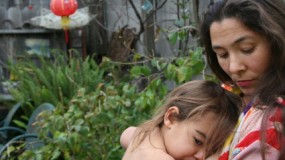Public Breastfeeding in New Jersey
Every mother has the basic human right to breastfeed her baby. It is not illegal to breastfeed your baby in public in New Jersey or in any state in the United States. New Jersey law specifically protects the right to breastfeed in public, permitting every mother to breastfeed in any place within a place of public accommodation where she is otherwise entitled to be. Public accommodations include most private businesses or buildings that are open to and/or offer services to the general public.
New Jersey Public Breastfeeding Law
N.J.S.A. 26:4B-4
Notwithstanding any provision of law to the contrary, a mother shall be entitled to breast feed her baby in any location of a place of public accommodation, resort or amusement wherein the mother is otherwise permitted.
N.J.S.A. 26:4B-5
a. The local board of health or such board, body or officers exercising the functions of the local board of health according to law, upon written complaint and having reason to suspect a violation this act has occurred shall, by written notification, advise the owner, manager or other person having control of the public accommodation, resort or amusement of the initial complaint and of the penalties for any subsequent complaints. Thereupon, any owner, manager or other person having control of the public accommodation, resort or amusement receiving such notice who knowingly fails or refuses to comply with the provisions of this act is subject to a fine not to exceed $25.00 for the first offense following initial notification and not to exceed $100.00 for the second offense and not to exceed $200.00 for each offense thereafter. When there exists no local board of health or such board, body or officers having the authority to exercise the functions of the local board of health according to law in the municipality in which a violation of this act has allegedly occurred, the State Department of Health and Senior Services shall exercise the functions of the local boards of health for purposes of this act.
b. Any penalty recovered under the provisions of this act shall be recovered by and in the name of the Commissioner of Health and Senior Services or by and in the name of the local board of health. When the plaintiff is the Commissioner of Health and Senior Services, the penalty recovered shall be paid by the Commissioner into the treasury of the State. When the plaintiff is a local board of health, the penalty recovered shall be paid by the local board into the treasury of the municipality where the violation occurred.
c. Every municipal court shall have jurisdiction over proceedings to enforce and collect any penalty imposed because of a violation of any provision of this act, if the violation has occurred within the territorial jurisdiction of the court. The proceedings shall be summary and in accordance with “the penalty enforcement law,” N.J.S. 2A:58-1 et seq. Process shall be in the nature of a summons or warrant and shall issue only at the suit of the Commissioner of Health and Senior Services, or the local board of health, as the case may be, as plaintiff.
EFFECTIVE MAY 19, 1997
Legislative Statement
The Legislature finds and declares that: the Surgeon General of the United States recommends that babies from birth to one year of age should be breast fed, unless medically contraindicated, in order to achieve a healthy start on life; breast milk strengthens the immune system of babies, improves digestion and is of better nutritional value than regular milk; other benefits include the establishment of a strong mother-baby bond and a potential increase in baby’s IQ level; despite the Surgeon General’s recommendation, statistics reveal a declining number of women are choosing to breast feed their children, and nearly half of all new mothers are now choosing formula over breast milk even before they leave the hospital; the social constraints of modern society impede a woman’s choice to breast feed due to embarrassment, fear of criminal prosecution and lack of public acceptance; therefore, it is in the best interest of the State to recognize breast feeding in places of public accommodation as an important right which must be encouraged in order to promote child health.

